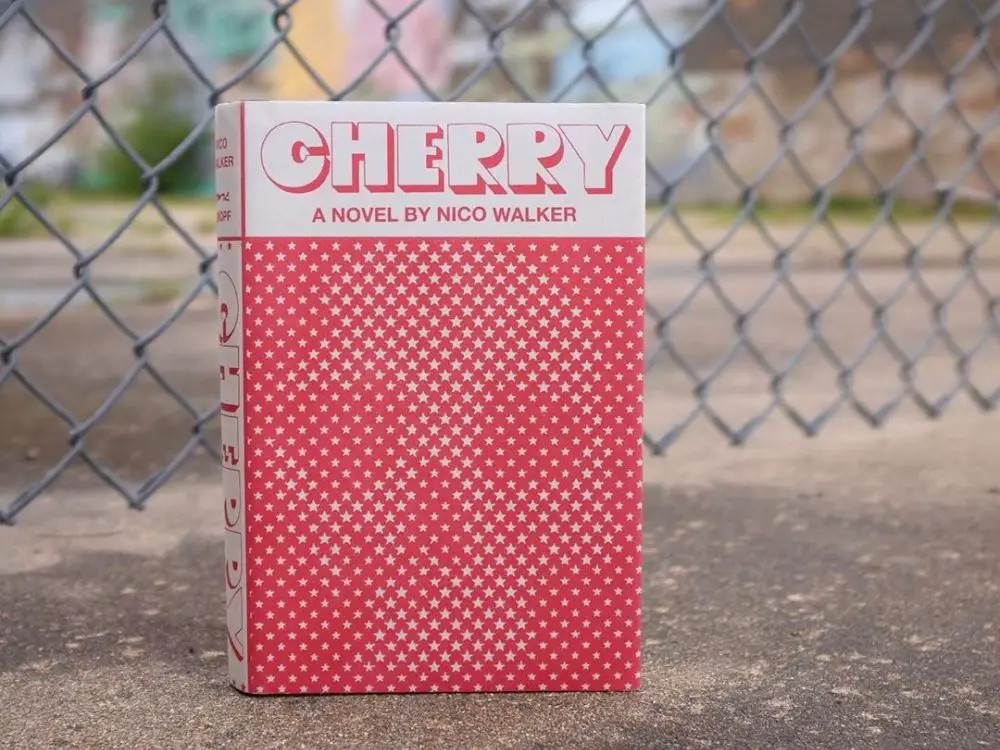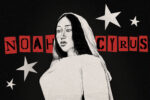Nico Walker’s debut novel, “Cherry,” begins with no preamble or explanation. It begins as the narrator looks for a shirt without blood on it and pants without cigarette burns in the crotches, but he can’t find any — he ironically identifies his style as “heroin chic.”
His dealer, nicknamed Black, shows up and weighs out a gram of heroin, which the narrator and his girlfriend, Emily, shoot. He passes out and wakes up with Emily standing over him, trying to shock him out of overdosing by putting ice cubes in his underwear. He takes the ice out; she goes to work. Black drives the narrator through town, stopping on a corner where the narrator then gets out, walks down the block and robs a bank.
The author’s note that precedes the prologue states: “This book is a work of fiction. These things didn’t ever happen. These people didn’t ever exist.” But finding the differences between Walker’s life story and the plot of “Cherry” feels like an unsolvable children’s magazine activity.
On Dec. 10, 2010, Nicholas “Nico” Walker woke up with a greater sense of purpose than he had in a long time: He was going to rob a bank. He dropped his girlfriend off at work and had almost $2,000 handed to him after slipping a note to a bank teller that read, “This is a robbery.” In the next four months, he robbed nine more banks in the Cleveland area, getting away with nearly $40,000 and giving most of it to friends and family or burning it. On April 11, 2011, he stole $7,426 from a bank in a Cleveland suburb before being caught by police. The first day of June the next year, he was sentenced to 11 years in prison.
Robbing banks isn’t the whole story; in 2005, Walker left home to spend the next 11 months in Iraq as a medic, participating in around 250 combat missions. After he returned home in the fall of 2006, he found himself on a steep downward trajectory. He and his wife divorced, and he suffered from insomnia, anxiety and PTSD, leading him to self-medicate with Oxycontin after unsuccessful doctors visits.
A year after his return from Iraq, Walker used heroin for the first time. His use became chronic and his other coping mechanisms became more violent, but nothing was helping — until he started robbing banks.
Walker’s story gained attention after a long-form feature about his life and arrest was published by Buzzfeed. A small publishing company then contacted him about publishing his writing, which led him to writing on an old typewriter in the Kentucky federal prison, in which he remains until November of this year. After almost four years of writing, Walker was able to sell “Cherry” to Tim O’Connell at Knopf, an imprint of Penguin Random House. The novel was published in 2018 and named “the first great novel of the opioid epidemic” by Vulture.
From beginning to end, “Cherry” is blunt and without frills. The cover, designed by Janet Hansen, features a skull made of stars on a red background, not only to represent the contents of the story, but to show how it is “uniquely American.”
The prologue prepares readers for what’s to come as the first chapter brings Walker’s unnamed narrator back to 2003, where he’s a college student with no true path yet. He meets Emily, a young woman who seems to have more of a plan, and they fall in love. But, he’s unhappy, so he decides to enlist in the military.
While in Iraq, he struggles with his role as a medic as he attempts to help the wounded with Ibuprofen and limited training. His most-used equipment is probably body bags. He watches porn and sees his fellow soldiers die. He kills and he smokes. The monotony of his deployment is only broken up by moments of sheer terror. And then, when he returns home, he develops a heroin addiction.
Walker’s writing isn’t poetic. The prose is simple throughout most of the novel and the most elegant it gets is when he describes a high. Walker is unflinching with his words, never giving readers a reprieve as he depicts the devastating cycle of the narrator’s addiction, PTSD and armed robberies. He isn’t self-conscious with his words or his choices. The repetition of the story is hard to break out of, almost relentless.
The story itself, however, is able to make up for what the writing and structure lack. The narrative is so compelling that the rights for a “Cherry” film were auctioned off in August 2018 to AGBO, Joe and Anthony Russo’s new film company. The Russo brothers, best known for their work on “Avengers: Infinity War” and “Avengers: Endgame,” bought the rights for $1 million at auction, but only after a short delay when Walker ran out of minutes on the prison phone. The Russos have spoken about coming from Cleveland and having lost friends to the opioid epidemic, making the project personal. “It means a lot to us to be able to film in our hometown,” the brothers said in a press release last fall before filming began.
Tom Holland was announced to be involved in the film in March of 2019, making a mature departure from his typical roles like Peter Parker in the most recent “Spider-Man” films and his work as children’s animation voice actor. Other cast members include Ciara Bravo, Bill Skarsgard and Jack Reynor. Although the film is currently in post-production and is scheduled to be released sometime this year, Joe Russo voiced his concerns over releasing the film during the current COVID-19 pandemic. However, he praised Holland’s “Oscar-worthy” performance, saying, “He is shredding himself, physically and emotionally.” As both the film and Walker’s releases approach, a lot is up in the air.
“Cherry” doesn’t have a clean ending. There is no closure to the novel, no resolution that allows the reader to close it with a certain kind of satisfaction. Maybe, this is because Walker’s story isn’t over yet. He doesn’t know who he’ll be after his release from prison, where he’ll go or what he’ll do. Although, he is working on another book.
Adapting “Cherry” for the silver screen may prove challenging for the Russo brothers, but it will be undoubtedly fascinating to see how the story plays out on screen and it will certainly encourage conversation, just like the novel and its author’s life have.

















